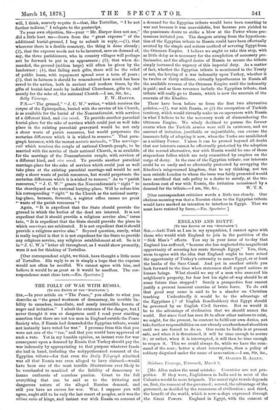THE FOLLY OF WAR WITH RUSSIA.
[TO THE EDITOR OF THE " SPECTATOR.-]
SIE,—In your article on "The Peace," you allude to what you 'describe as "the grand weakness of democracy, its terrible lia- bility to causeless, immediate, and nearly irresistible bursts of anger and irritation." I admit the existence of the danger, but I never thought it was so dangerous until I read your startling assertion that there are not ten men in England outside the Peace Society who, if Russia had demanded the Egyptian tribute, would not instantly have voted for war." I presume from this that you were not one of the "ten," and that you would have approved of such a vote. Yet in my humble opinion, an instant vote for war consequent upon a demand by Russia that Turkey should pay the war indemnity by appropriating to that purpose whatever funds she had in hand, including the unhypothecated remnant of the Egyptian tribute—for that even the Daily Telegraph admitted was all that Russia was even alleged to have claimed—would have been one of the most terrible illustrations ever likely to be vouchsafed to mankind of the liability of democracy to insane outbursts of senseless passion. Grant to the• full everything that can be said as to the irritating and 'dangerous nature of the alleged Russian demand, and still you have no excuse for war. War, I suppose you will agree, ought still to be only the last resort of peoples, as it was the ultima ratio of kings, and instant war with Russia on account of a demand for the Egyptian tribute would have been resorting to war not because it was unavoidable, but because you yielded to the passionate desire to strike a blow at the Power whose pre- tensions irritated you. The dangers arising from the hypotheca- tion of the Egyptian tribute to Russia could have been effectually averted by the simple and serious method of severing Egypt from the Ottoman Empire. I believe we ought to take this step, with as little delay as is necessary for the completion of necessary pre- liminaries, and the alleged desire of Russia to secure the tribute simply increased the urgency of this imperial duty. As a matter of fact, whether the Egyptian tribute is mentioned in the Treaty or not, the levying of a war indemnity upon Turkey, whether it be twelve or thirty millions, virtually hypothecates to Russia all the available revenue of the Ottoman Empire until the indemnity is paid ; and as these revenues include the Egyptian tribute, that tribute will really go to Russia, which is now the suzerain of the suzerain of the Khedive.
There have been before us from the first two alternative policies,—(1), war with Russia, or (2) the occupation of Turkish territory, which would virtually make us co-operators with Russia in what I believe to be the necessary work of dismembering the Ottoman Empire. We wisely declined to pursue the former course when the Turkish armies were still in existence, and no amount of irritation, justifiable or unjustifiable, can excuse the insensate folly of adopting it now, when the Turks are annihilated as a military Power. Unless it can be proved beyond all doubt that our interests cannot be effectually protected by the adoption of the second alternative, war with Russia would be one of those stupendous follies which are only committed by empires on the verge of decay. In the case of the Egyptian tribute, our interests could be so easily and so effectually protected by occupying the Khedive's misgoverned kingdom, that to my thinking, not ten men outside London to whom the issue was fairly presented would have sacrificed that safe policy to a desire to satisfy, at the tre- mendous cost of war with Russia, the irritation occasioned by a demand for the tribute.—I am, Sir, &c., W. T. S.
[Our correspondent criticises words a little too closely. Our obvious meaning was that a Russian claim to the Egyptian tribute would have marked an intention to interfere in Egypt. That we must have resisted by force.—En. Spectator.]


































 Previous page
Previous page